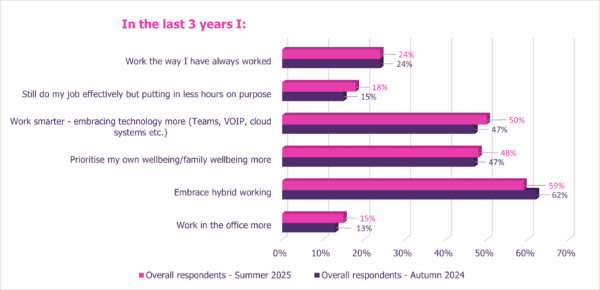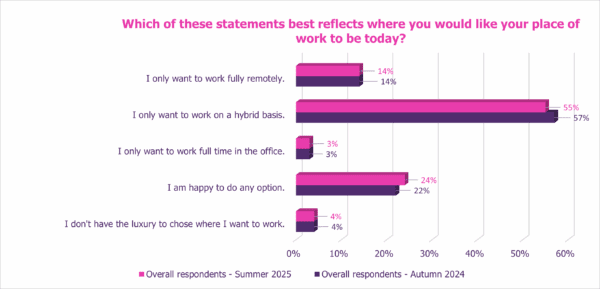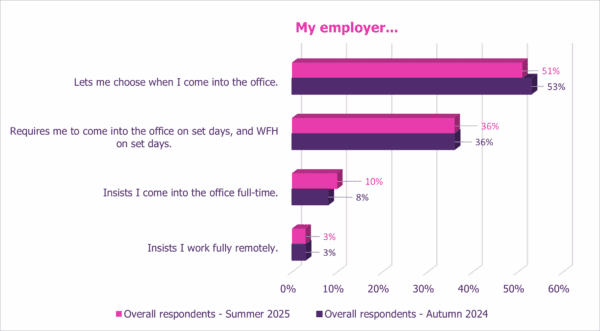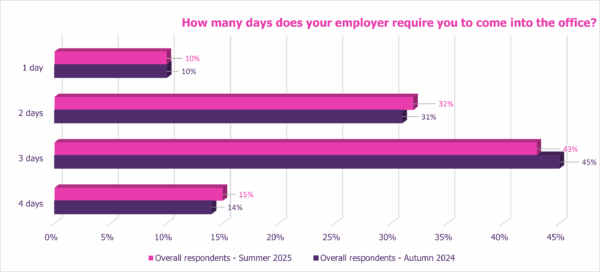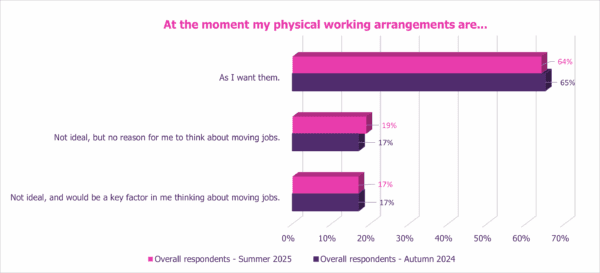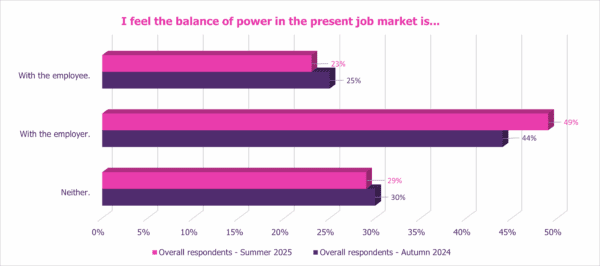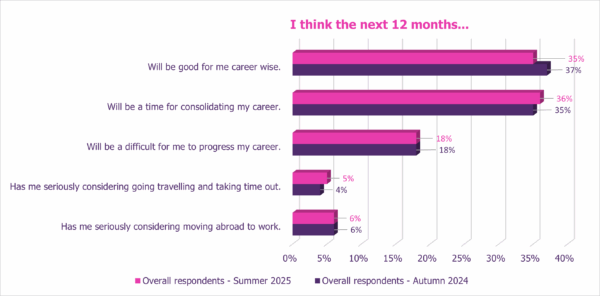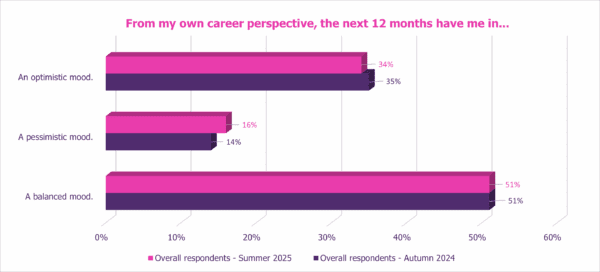Candidate sentiment survey: Part one — expectations, remote working, and the balance of power
Paul McArdle | Talent & Recruitment Columnist | The Currency
The Panel runs a candidate sentiment Survey for The Currency twice yearly to assess candidates’ attitudes to specific topics.
The candidates surveyed were from junior management to the C-suite level in the IT, finance, accounting, legal, HR, banking, and ESG professions. Some 1,634 candidates completed the survey.
The candidates were presented with a multiple-choice answer for every question.
We compare the answers in the summer 2025 survey to the last survey, in which we asked the same questions.
The survey had a free-text box at the end, and close to 10 per cent of the candidates chose to give us their observations on certain topics.
In part one of the findings, we look at the issue of working from home, future expectations, and the balance of power in the workplace.
The results were mostly consistent with the results in our autumn 2024 survey, with “work in the office” at 15 per cent, up two points, and over twice the seven per cent figure in autumn 2023.
We are also seeing a further decline in “embrace hybrid working”, down three per cent (62 per cent to 59 per cent) from autumn 2024, but down from 67 per cent in autumn 2023.
Again, the results are consistent with the autumn figures, with slight variance. The fact that three out of every one hundred candidates only want to work full-time in the office is a key figure. However, one in four candidates is open to any working arrangement, so, in theory, that figure may not be so stark. What is clear is that candidates want flexibility in their working arrangements.
The most significant change is the 25 per cent increase in employers requiring candidates to work full-time in the office (from eight per cent to 10 per cent) compared to our last survey. While this is coming from a low base, we in The Panel are dealing with more clients, making this a prerequisite. Combining this with the previous graph, which shows that candidates still want flexibility, has led to friction in expectations between the parties and makes recruiting for these clients particularly challenging.
What the respondents said:
“The current job market feels uncertain, and securing new opportunities has become noticeably more challenging. The hybrid working model is still the most popular in the tech sector, but more companies are implementing a return to the office for more days, however, without clear communication on why.“
“There is more distrust with remote working during the past 18 months, there seems to be very few remote roles on offer.“
“Time in office is good for business, and it’s great to reflect this in surveys… we need to look after the needs of business as well as employees.“
“Some companies have stated they are full-time back in the office. But this is not the case due to personal arrangements made during the Covid period.“
We asked candidates who were not working full time in the office or working fully remotely to let us know how many days they are actually in the office.
Three days a week in the office is still the most common hybrid arrangement. The trend of working four days a week in the office is worth keeping an eye on (11 per cent in 2023, 14 per cent last Autumn) and is now at 15 per cent.
What the respondents said:
“Unfortunately, I think many in management are not ready or willing to understand the wave of the digital generation, who are only looking for qualitative and efficient digital engagement. Therefore, remote options, good customer service, price and time efficiencies, and career development need to be priorities for employers.“
“Younger employees want to work remotely more and need to be encouraged to come into the office.”
“I believe that return to office mandates in financial services are driven by banks’ exposure to real estate lending and as a justification for the cost of their own traditional landmark buildings.“
“As an employee, I appreciate the benefits of remote working, but as a manager, I realise the significant disadvantages of remote working. Managing a team and the team’s objectives is significantly more difficult when staff work remotely. I also feel that colleagues cannot work as effectively, cannot develop personality and cannot develop personal working relationships and interpersonal skills while working remotely. I have therefore formed the strong view that working remotely should be limited to one or a maximum of two days per week.“
“I think most people want to retain some sort of hybrid working arrangement to maintain a work-life balance and flexibility. However, you can see that more and more companies are looking to get staff back to the office or working four days a week. From a work perspective, I think with all the geo-political issues in the world, it is creating uncertainty, meaning people don’t move jobs.“
One in six respondents cite their physical work environment as a reason to seek another role, with just over a third of respondents being dissatisfied with their physical work environment overall —a finding consistent with our previous survey results. That said, two out of three respondents are happy.
What the respondents said:
“My hope is that employers can understand the benefits to the working from home option, emphasis being on the word option, it is all about the flexibility in a role that should be on offer if possible from employers, some people prefer to be in the office and that’s fine while others prefer or perhaps due to personal circumstances need to work from home more regularly, it’s about being flexible to the employee and once the work is done on time then there should be no issue, trust is unfortunately lacking from some employers.“
“The housing market is a huge problem for recruiting younger talent and having them work from a Dublin city centre office.“
There has been a big change in 18 months. Half the respondents now believe the job market favours the client. In Autumn 2023, candidates felt it was an employee market (37 per cent felt the power was with the employee, 31 per cent with the employer). We saw the trend towards a client market begin in our last survey results (44 per cent to 49 per cent now).
In The Panel, we are finding some clients are more prescriptive about what they want. We are also finding that some candidates are struggling to adapt to the change in power in the market, particularly when it comes to hybrid and remote working roles.
For hybrid roles, clients are looking for the split to be more time in the office (normally three days in office, two days WFH). We are also seeing a fall-off in fully remote roles.
What the respondents said:
“Financial services, particularly asset management – it’s an employers’ market and they are calling the shots on more office time. I also see hybrid working being used as a tool to encourage people to leave against this cost-cutting geopolitical backdrop – lots of redundancies followed by changes to hybrid working rules to encourage more people to leave without having to pay out on redundancy payments. Not a great environment for employees at the moment. AI is also being used as an excuse to cut staff numbers, even though it’s still in its infancy.“
“Remote/hybrid work is becoming less common, with employers insisting on more office presenteeism.“
“I feel there is more balance coming back into the market now that Covid is firmly in the rear-view mirror. I think that flexibility is a new norm, and that employers that are insisting that their teams are in offices full-time are simply dinosaurs at this point.“
There is little change from our Autumn findings. That only one in three candidates thinks that 2025 will be good for their career is worth noting. One in five candidates believes this year will be tough for their career, consistent with previous surveys.
What the respondents said:
“Ageism is strong (speaking from experience).“
“Much of the challenges ahead will be driven by global macro challenges which are outside the control of the vast majority of people, smart people will adapt and overcome, others well they will probably eventually figure it out – it is only ever a job, so it pays to take it all in your stride and get the best pay cheque you can when you can.“
In our Autumn 2023 survey, respondents in a pessimistic mood were at 10 per cent. Today’s figure of 16 per cent sees a 60 per cent rise, something to keep an eye on. This is consistent with the fact that the jobs market is back being client-led. Candidates must be more flexible when looking for new employment than they were post-Covid.
Overall, candidates are being more realistic about the job market. The market is not as frothy as it was, and candidates are adapting accordingly. There is still some resistance to going back into the office, however candidates are finding that they do not have the choices they had previously. We believe hybrid working is here to stay, but we expect the trend to go back to working in the office to continue.

